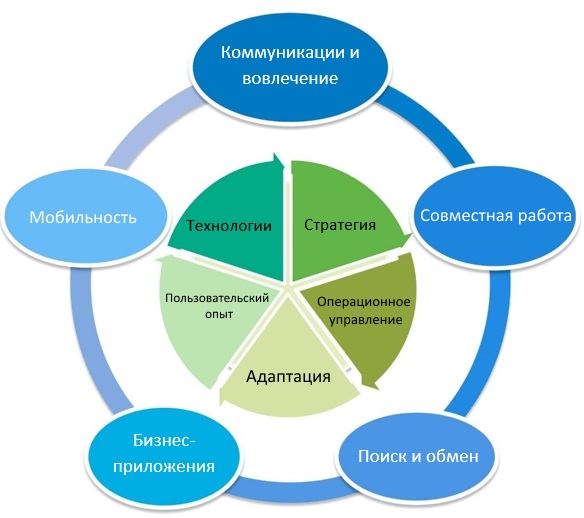Digital workplace: what is it really?
How many organizations - so many definitions of the digital workplace (digital workplace). However, in the light of recent trends, it would be extremely useful to finally get rid of the confusion about what the digital workplace really is and what it is not.
Most often, a digital workplace is a virtual equivalent of a physical workplace. It requires careful planning and management due to its fundamental role in productivity, engagement and a healthy working climate.
Understanding the concept of a digital workplace varies across organizations. However, in its essence it includes three main elements:
')

The digital workplace provides organizations with five possibilities (the outer ring in the figure):
In order to work well, they are supported by five elements (inner ring pic.):
This model is intentionally made non-directive. You are not required to have a social intranet, corporate network, mobile applications or other technologies. What you use to provide services will change over time in accordance with the requirements of the organization.
The visible parts of a digital workplace are the technologies and methods of work that allow people to unite, communicate and interact, not necessarily face to face. One of the articles of Deloitte shows it as follows:
“The digital workplace includes all the technologies that people use to perform work in a modern workplace ... These technologies range from HR applications and business applications to e-mail, instant messaging, as well as corporate social communications and virtual meetings.”
E-mail, intranet and web conferencing are typical elements of a digital workplace. Nevertheless, it is the emphasis on the employee that makes the digital workplace something more than just a collective term for all these technologies.
An effective digital workplace separates work from physical location for most of the time. Such a “release” of a person has a number of important consequences, not only for where people work, but also for how teams are formed and how people come together to solve local problems. Microsoft Vice President Western Europe Klaus Holse put it this way:
“In the future, successful companies will be those that break down the barriers between people, their workplace and technology, and also enable employees to be productive and creative, wherever they are. <...> This requires a corporate culture that puts people first. ”
Definition of the term “Digital Workplace”
Most often, a digital workplace is a virtual equivalent of a physical workplace. It requires careful planning and management due to its fundamental role in productivity, engagement and a healthy working climate.
Understanding the concept of a digital workplace varies across organizations. However, in its essence it includes three main elements:
')
- People oriented
- Technologies allowing to realize it
- Management and design

The digital workplace provides organizations with five possibilities (the outer ring in the figure):
- Communication and employee involvement
- Teamwork
- Search and share knowledge
- Business applications (process-oriented as well as self-service)
- Mobility - the ability to work at the right time in the right place.
In order to work well, they are supported by five elements (inner ring pic.):
- Strategic planning
- Operational management
- Proactive user engagement
- High level of convenience based on user experience
- Reliable, safe and flexible technology
This model is intentionally made non-directive. You are not required to have a social intranet, corporate network, mobile applications or other technologies. What you use to provide services will change over time in accordance with the requirements of the organization.
Digital Workplace Technologies
The visible parts of a digital workplace are the technologies and methods of work that allow people to unite, communicate and interact, not necessarily face to face. One of the articles of Deloitte shows it as follows:
“The digital workplace includes all the technologies that people use to perform work in a modern workplace ... These technologies range from HR applications and business applications to e-mail, instant messaging, as well as corporate social communications and virtual meetings.”
E-mail, intranet and web conferencing are typical elements of a digital workplace. Nevertheless, it is the emphasis on the employee that makes the digital workplace something more than just a collective term for all these technologies.
What NOT is Digital Workplace
- This is not a fancy intranet renaming.
- It's not about social networks, social or mobile intranets ...
- ... and not about social business or social organizations
Why does all this matter
An effective digital workplace separates work from physical location for most of the time. Such a “release” of a person has a number of important consequences, not only for where people work, but also for how teams are formed and how people come together to solve local problems. Microsoft Vice President Western Europe Klaus Holse put it this way:
“In the future, successful companies will be those that break down the barriers between people, their workplace and technology, and also enable employees to be productive and creative, wherever they are. <...> This requires a corporate culture that puts people first. ”
Source: https://habr.com/ru/post/320384/
All Articles